
views
X
Trustworthy Source
Cleveland Clinic
Educational website from one of the world's leading hospitals
Go to source
Home pregnancy tests are available at most drug stores and online. Read on for a step-by-step guide to using home pregnancy tests.
Before Taking the Test
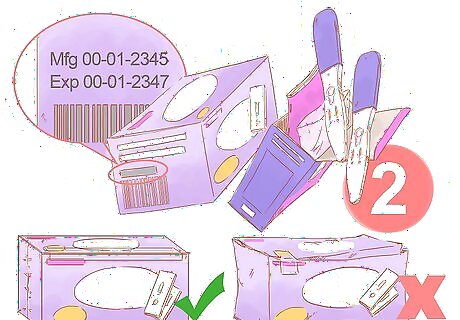
Purchase a home pregnancy test from a pharmacy or superstore. There are many different brands of home pregnancy tests on the market, but it doesn't really matter which you choose. All home pregnancy tests work the same way—by detecting levels of the hormone HCG in your urine. When purchasing a pregnancy test, check the expiration date on the box and ensure the box is fully intact, with no wear and tear, as this could affect your result. Think about getting a brand that provides 2 test sticks in the box, especially if you're planning on testing early. This way you can wait a week before trying again, if you get a negative result first time around. Some experts advocate buying a pregnancy test from a large store that has a high turnover so that you are more likely to get a newer pregnancy test, rather than one that has been sitting on a shelf for months. Similarly, if you've had a pregnancy test lying around at home for several months, consider throwing it out and getting a new one, especially if you've been storing it somewhere warm or prone to dampness, as this can affect the results of the test. Some brands claim that they can accurately detect pregnancy on the day of your missed period or even earlier. While it's true that the tests may be sensitive enough to pick up on higher HCG levels in your urine, it may be too early in your pregnancy for your body to actually produce higher levels of HCG. In this case, you run the risk of getting a negative result, even though you might indeed be pregnant. Many of the generic brand drugstore pregnancy tests are actually produced in the same factories as the big-name brands and use the same technology. So don't worry about the quality of the generic brands if you're trying to save some dollars.
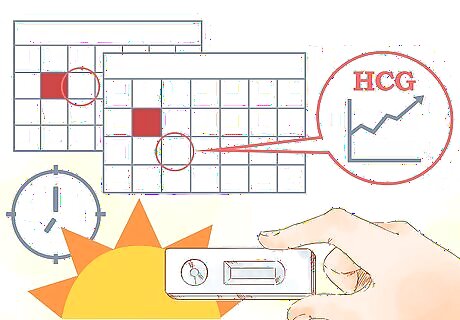
Take the test after the first day of a missed period. Most experts advise that you should wait at least 1 day after your missed period before taking a home pregnancy test, though waiting a week is considered best. This can be tough when you are anxious to find out if you're pregnant, but waiting allows for a higher degree of accuracy when taking the test, as HCG levels rise rapidly in pregnant people. HCG develops in a person's body only after a fertilized egg implants in her uterus. Implantation of the fertilized egg typically occurs on or around the 6th day after the sperm and egg have merged. This is why home pregnancy tests won't pick up on any HCG if you take the test too early, even if you are pregnant. As a rule of thumb or if you have irregular periods, you should wait 3 weeks after sex to take a pregnancy test. However, if you are in a hurry, most tests will work after 2 weeks (approximately when your period is due).

Take your test as early in the morning as you can. Early in the morning, your urine tends to be more concentrated, which means that there may be higher levels of HCG present. Try to do the test when you pee for the first time during the day. Avoid taking the test right after drinking large amounts of water, since this can dilute your urine. If you choose to do the test later in the day, try to hold your urine for at least 4 hours first so that it is more concentrated.

Read the instructions carefully and follow them. Although most home urine tests are pretty much the same, it is important to follow the manufacturer’s instructions. Specifics may vary for each pregnancy test, such as the method of collecting the urine, the length of time you need to urinate on the stick, and the symbols used to indicate whether you're pregnant or not. It's better to familiarize yourself with the symbols used in advance, as you don't want to be anxiously scrambling for the instructions when the test displays its results. There should be a toll-free number on the box or instructions which you can call if you have any questions or concerns about the method of taking the test or the product itself.

Take time to prepare emotionally before taking your test. Taking a home pregnancy can be a nerve-wracking experience, particularly when you're anxiously hoping for one result or the other. Take the test privately and give yourself as much time as you need, or have your partner or a close friend stand outside the bathroom door to talk you through it.
Taking the Test
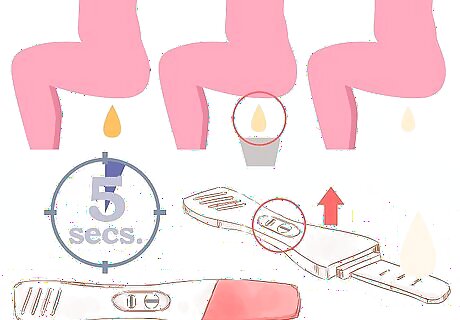
Urinate on the testing stick, if directed. Wash your hands with warm water and soap, then carefully remove the testing stick from its wrapper. Sit on the toilet and urinate either on the testing stick or into the small plastic cup provided, depending on the type of test. The instructions may recommend collecting a midstream sample, which means you should pee a little first before you collect any urine in the cup or insert the stick. If you need to urinate directly on the stick, make sure to follow the instructions carefully. With some tests, you need to urinate on the stick for a very specific time—for example, exactly 5 seconds, no more and no less. Use a stopwatch to help you time it, if necessary. When urinating on the stick, make sure to place the absorbent end of the stick into the urine stream and turn it so that the display window faces upwards.
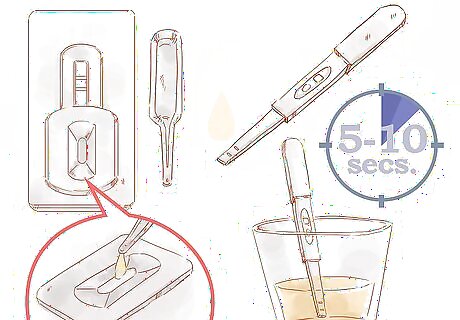
Use the dropper to place a small amount of urine onto the test stick, as an alternative. This is only required for the plastic cup method. Drop the urine into the well indicated on the stick. Alternatively, some brands require that you dip the absorbent end of the test stick into the collected urine. Hold it there for 5 to 10 seconds, or for the amount of time indicated in the instructions.
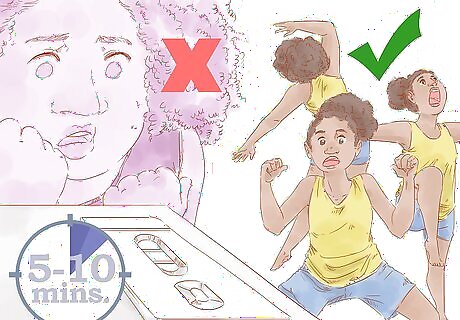
Wait the stated amount of time (usually, up to 10 minutes). Place the testing stick on a clean, level surface with the result window facing up. Wait time is typically between 1 to 5 minutes, though some tests may take up to 10 minutes to give an accurate result. See the instructions to find out the required amount of time for your particular test. Try not to stare at the stick for the duration of the waiting period; time will seem to go slower and you'll become even more anxious. Do something to distract yourself, like making a cup of tea or doing some stretches or exercises. Some sticks will have a little timer symbol or line to show that the test is working. If your test stick is supposed to have this function and nothing appears on the screen, it is likely that your test is not working properly and you may need to use a different one.
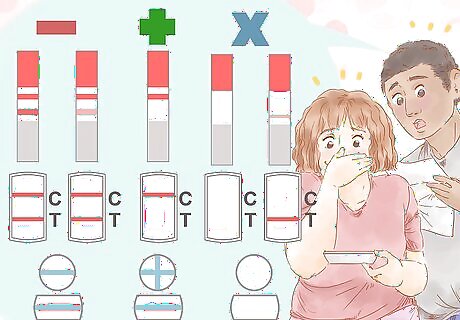
Check the results. Once the amount of time stated in the instructions has passed, check the test stick for results. The symbols used to indicate whether you are pregnant or not vary from test to test, so read the instructions again if you are unsure. Most home pregnancy tests use something like a plus or minus sign, a coded color change, or the words "pregnant" or "not pregnant" on a digital display. Sometimes a line or symbol will appear only very faintly on the display screen. If this happens, you should still consider it a positive result as this indicates that the test has picked up on hCG in your urine. False positives are very rare. If the results are positive: You should make an appointment with your doctor to have the pregnancy confirmed. This may be done using a blood or urine test. If the results are negative: Wait another week, and if you still haven't started your period, do the test again. False negatives are fairly common, especially if you miscalculated your ovulation date and took the test too soon. This is why many home pregnancy tests come with 2 test sticks. If the second test comes back negative, make an appointment with your doctor to find out if there is some other problem affecting your menstruation or causing symptoms of pregnancy.




















Comments
0 comment